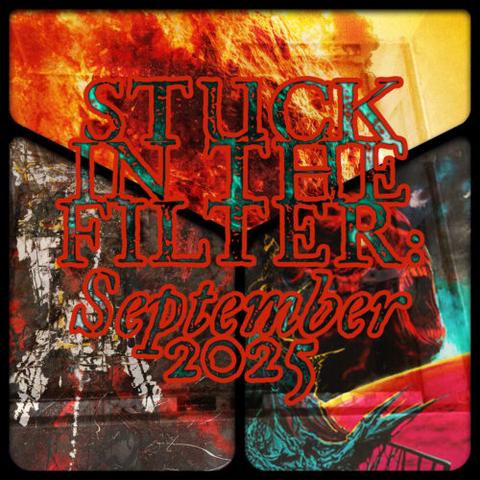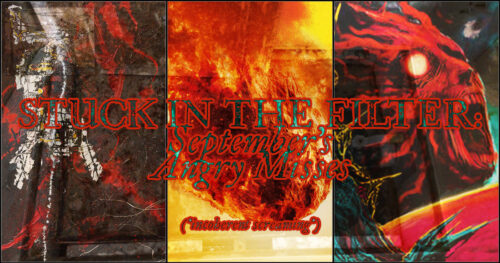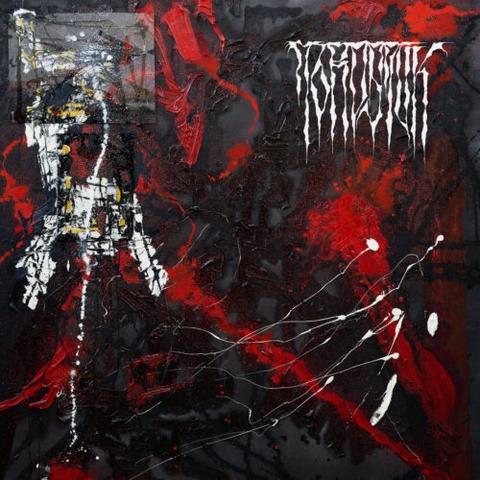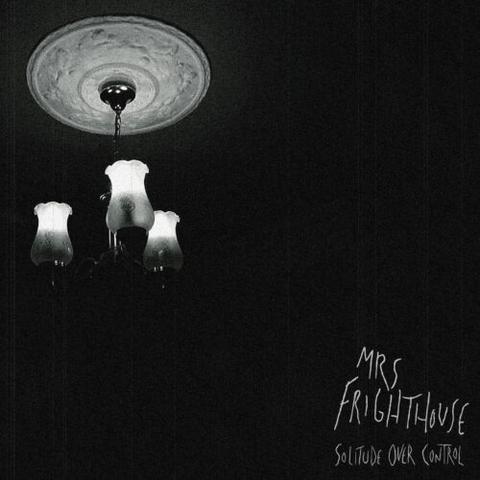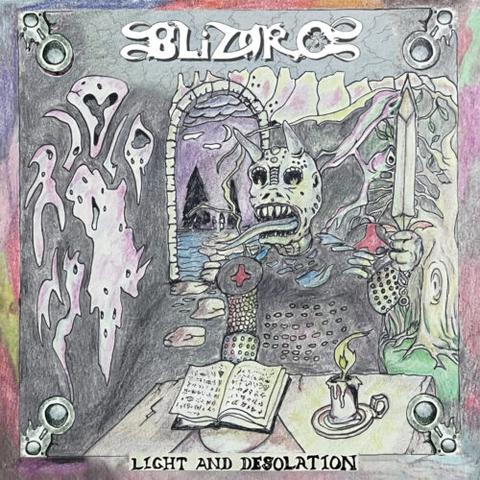Stuck in the Filter: September 2025’s Angry Misses
By Kenstrosity
At last, a burst of cool calms the blood after a brutal summer, and the leaves are turning. Which means I was able to recruit a bunch of grubby little leaf-lookers off the highway to serve as minions to my ever-needy Filter! With a temporarily replenished staff of fools who are unwittingly risking their lives for mere nuggets, I conduct with renewed vigor the search for quality finds.
Today, I bring you those finds, in all of their sparkly glory. WITNESS THEM!
Kenstrosity’s Jaunty Juke
Jordsjuk // Naglet til livet [September 19th, 2025 – Indie Recordings]
The lack of conversation I’ve seen surrounding this Norwegian black metal riff machine is highly disconcerting. Brought to my attention by my wonderfully wise—and devilshly handsome—owlpal1 from… GASP… another blog, Jordsjuk’s debut LP Naglet til livet has my spine whipping to a fro from the onset of ripping opener “Kollaps.” The whiplash doesn’t stop there as thrashy numbers “Grovt skadeverk” and “Skreddersøm” body me against several walls and even a couple of ceilings. For 36 relentless minutes, with only one song pushing the four minute mark, Naglet til livet is an unqualified triumph of editing and tight, effective songwriting. My immediate comparison is 2007-2013 Skeletonwitch, but some of these riffs, like the turbobangers on “Parasitt,” “Rottebitt,” “Klarhet og dybde,” and “Rennestein,” give those hallowed skellybois a serious run for their money. When they aren’t thrashing, Jordsjuk shift into a dour, but still ravenous black metal shadow. Wraiths like “Riv skorpen av såret” and “Svikter din neste” showcase this looming character quite well, and prove Jordsjuk to be dynamic, versatile songwriters. In short, Naglet til livet is a raucous good time for anyone craving black metal with sharp teeth and limitless energy.
Baguette’s Bouncy Blessing
Arjen Anthony Lucassen // Songs No One Will Hear [September 12th, 2025 – Inside Out Music]
A year without an Arjen record would be a much lesser one. It’s not often the crazy Dutchman reuses a non-Ayreon project title, but here we have his fourth solo album becoming the second under the full Arjen Anthony Lucassen name! Dropping 13 years after the previous one, Songs No One Will Hear announces the end of the world is a mere five months away, its tracks depicting the resulting stages of chaos, disarray, and human silliness. It doesn’t fall far off the catchy and melodic Arjen tree but casts a wider net than prior prog rock adventures. Much of the record reflects different eras of Ayreon, including the ’70s prog whimsy of Into the Electric Castle (“Dr. Slumber’s Blue Bus”) and the fun ’80s metal edge of The Source (“Goddamn Conspiracy”). Closing epic “Our Final Song” is a microcosm of his musical breadth, shapeshifting from Jethro Tull flute shenanigans to analog synth ambience to dramatic riff bombast at will. But it’s “The Clock Ticks Down” that steals the spotlight, marking a brief return to the dark, somber grit of Guilt Machine and 01011001. It’s an unusually normal-sized album from Mr. Lucassen as well, the regular, unnarrated version being only 46 minutes and change. A condensed, jovial jack-of-all-trades showcase with many of the usual great guest musician and vocalist selections! And it’s always nice to hear him sing more, too.
Thus Spoke’s Lurid Leftovers
Fauna // Ochre and Ash [September 26th, 2025 – Lupus Lounge/Prophecy Productions]
It’s been 13 years since Cascadian black metal duo Fauna released Avifauna, to quiet yet great acclaim. Given their preoccupation with human prehistory, they might just be operating on a larger timescale than you or I. Ochre and Ash—the two main ingredients used in ancient cave paintings—is an attempt to invoke the spirit of forgotten ceremonies during which the stories of the people were immortalised on stone. Building on an atmospheric black metal base familiar in their better-known exemplars Wolves in the Throne Room and Agalloch, Fauna give Ochre and Ash a distinctive edge by roaming further afield into the experimental. For every metal-dominated track (“Nature & Madness,” “Labyrinths,” “Eternal Return”), there is an ambient, decidedly unsettling counterpart (“A Conjuring,” “Femoral Sun,” “Mockery”), and the latter are not interludes, but integral parts of the ritual. Each infuses skin-prickling drone with eerie chimes and rattles, and uncomfortable vocalisations ranging from moans and wails to laughter and the howling, yipping cries of animals—or humans mimicking them. In their repetition of haunting, hollow sounds, they are both frightening and trance-inducing. Ochre and Ash’s metallic segments are no less ominous, treading as they do between confrontationally turbulent atmoblack2 and diSEMBOWELMENT-adjacent death doom that puts me right back in the void of madness last year’s Spectral Voice generated. This is not a casual listen, and Fauna could have helped it a bit with some editing, as the weirdness combined with an excessive 70-minute runtime makes some longer passages feel tired and could be off-putting to some. Still, it’s an experience I’d recommend trying at least once.
Spicie Forrest’s Sautéed Surplus
Piece // Rambler’s Axe [September 5th, 2025 – This Charming Man Records]
Finding gym metal has always proven difficult for me. It’s not about the fastest or loudest, but about striking a balance between weight and pace. Rambler’s Axe fits the bill nicely. Influenced by the likes of Crowbar and High on Fire, these Berlin-based doomsters peddle raucous and sludgy heavy metal. There’s a bit of Conan in Piece’s DNA, too, making sure to worship each riff long enough for you to make it through any given set. Beefy basslines and aggressive, chiseled drums make it easy to drop into a groove and get your pump on. Faster cuts like “Demigod” and “Rambler’s Axe” go great with chest flies and leg press, but they’ve got tracks for bench press and deadlifts too. “Bastard Sword” and “Owl Eyes” rumble forward like the slow but inevitable rise of the barbell at max weight. Whether marching or running, baritone shouts like tank treads hang over riffs just looking for an excuse to blow off steam. Whatever your reason for visiting the glorious house of gains, Piece has your soundtrack covered.
Heruvim // Mercator [September 12th, 2025 – Self-Release]
As each passing year leaves the almighty Bolt Thrower further in the past, the yearning for that sound grows. I was quite surprised to find a small amount of solace in Heruvim, hailing from Odesa, Ukraine. I say small solace, because debut LP Mercator is more than just a clone. Augmented with the unsettling atmosphere of early Pestilence and the vocal malevolence of Sinister, this platter of old school death metal carves its own niche in a storied scene. Off-kilter leads bubble up and spew out of a murky, tarred rhythm section like prehistoric gases in a primordial soup (“Gnosis,” “Lacrimae Rerum”). Lachrymose, doom-laden passages and violent death threats trade back and forth, anchored by volatile blast beats and percussive assaults in the vein of Cannibal Corpse (“Nulla Res,” “Mercator”). Stitched together with eerie, short-and-sweet interludes, Mercator’s lean 30 minutes fly by and always leave me itching for more. Heruvim riffs on a slew of classic sounds, creating a casual brutality and primal barbarism that is both compelling and uniquely their own.
ClarkKent’s Melodic Monstrosities
Galundo Tenvulance // Insomnis Somnia [September 17th, 2025 – Spiritual Beast Records]
Falling somewhere between symphonic deathcore acts Assemble the Chariots and Grimnis enters Japan’s Galundo Tenvulance. On their second full-length LP, Insomnis Somnia, the sextet demonstrates raw power and frenetic energy throughout its 41-minute runtime. Songs are anchored by catchy melodic leads, atmospheric symphonies, and punishing, relentless kitwork (no drummer is credited, so hopefully it’s not programmed). Galundo Tenvulance’s new vocalist, Sao, delivers the goods, bringing a spirited energy to her performance that elevates the already terrific material. While the symphonics don’t quite elevate the music the same way they do for Assemble the Chariots, it’s the melodic riffs that make these guys stand out. “Noble Rot” is the highlight, with a killer lead riff that uses harmonics to add just that extra bit of oomph. Other highlights include the catchy “Regret Never Sleeps,” evoking Character-era Dark Tranquillity, and “In The Realms of the Unreal,” which demonstrates their ability to transform solos into surprising melodies. This might be too good to have landed in the filter, but with my TYMHM slots filled up, it’s better than nothing.
Mortal Scepter // Ethereal Dominance [September 9th, 2025 – Xtreem Music]
As if we didn’t have enough thrash floating in the filter, French outfit Mortal Scepter finds itself as yet another piece of thrash dredged from the muck. This quartet has been around since 2012, yet Ethereal Dominance is only their second full-length release. Their sound lands somewhere between the melodic thrash of Bloodletter and the mania of Deathhammer—though a touch less zany. The persistent level of energy these bands can maintain never ceases to amaze me. While the constant beat of drum blasts threatens to make thrash songs sound too similar, the variety of melodies Mortal Scepter delivers ensures that things never grow repetitive. They have a raw, blackened sound that feels immediate and in your face. Drummer Guillaume keeps an impressive pace with fresh-sounding, nonstop blast beats, while vocalist Lucas Scellier snarls with enthusiasm, with a voice comparable to Deathhammer’s Sergeant Salsten. However, it’s the guitars by Maxime and Scellier that really bring the band to life, from the noodly melodies to the dynamic, lengthy, and impressive solos on each song. These guys prove they are more than just simple thrash metallers on the epic thrash, ten-minute finale, “Into the Wolves Den,” which uses a mix of tempo shifts and hooky melodies to make the song just fly by. With this second LP under their belts, these guys have proven themselves an exciting newish band on the thrash scene.
Grin Reaper’s Woodland Windfall
Autrest // Burning Embers, Forgotten Wolves [September 5th, 2025 – Northern Silence Productions]
Burning Embers, Forgotten Wolves merges atmospheric black metal with nature, resuming Autrest’s vision from debut Follow the Cold Path. Like Saor or Falls of Rauros, stunning melodies play across untamed backdrops that stir heartstrings in unexpected ways. Ethereal keys, mournful strings, and rapid-fire tremolos impeccably capture Burning Embers, Forgotten Wolves’ autumnal artwork, bringing Autrest’s imagery to life. Harsh vocals sit back in the mix, evoking windswept trees as cool harvest gusts leach branches of color, while sporadic baritone cleans add variation. “Lobos (Offering)” sets the stage with melancholic guitar plucks bolstered by forlorn strings, giving way to a controlled spark as “Ashes from the Burning Embers” ratchets up roiling vigor. Through forty-two minutes, Autrest expertly guides listeners across shifting landscapes that are delightful in their earnestness. Mastermind Matheus Vidor establishes himself as a preeminent architect of mood, channeling transitions from gentle, wonder-filled serenity to unyielding wrath. The dynamic between aggression and introspection is marvelous, permeating the album with emotion. While I could understand a complaint that some songs blur together, the spirit of Burning Embers, Forgotten Wolves is never stale or disposable. Rather, Autrest has taken what began two years ago and enriched it, composing an ode to self-discovery and transformation.3 My own experience with the music conjures wilderness’s last hurrah before succumbing to winter’s embrace. As days grow shorter and temperatures drop,4 I encourage you to seek refuge and draw warmth from these Burning Embers.
Dolphin Whisperer’s Very Not Late Novella
Sterveling // Sterveling [September 26th, 2025 – Self Release]
Between the world of atmospheric and post-tinged black metal, there exists a twisted form of progressive music that teeters about brooding moods and crackling tones to explore shrieking sadness and profound sorrow. Michiel van der Werff (Prospectors, Weltschmerz), primary Dutch proprietor of Sterveling, places his expressive guitar runs and lurching rhythm clangs in the company of trusted friends to carry out his tortured, baroque vision of black metal. Against the hissing design of synth maestro and Prospectors bandmate Matthias Ruijgrok, a fullness and warping warmth pervades the spacious amp textures and muscular rhythmic framework of each piece. And through the bloodied cries of Weltschmerz bandmate Hreim, a vocal lightning flashes to illuminate the nooks between pulsing synth lines and deathly bursts of full tremolo assault. In three longform pieces, all still totaling a generous forty-two minutes, Sterveling tints a monochrome narrative with vibrant shades from thoughtful tones and well-timed, emotional escalations. Committed to each careful iteration on a melody, the woven Sterveling web grows ever stickier with every passing moment, none of the ten-minute-plus excursions ever feeling even close to their declared runtimes. And with a sound construction that hits delicate yet forceful, creaking yet incising, it’s easy to wander through several journeys on this debut outing before realizing what time has passed. Fans of equally forlorn acts like Tongues or Andalvald will feel more at home here than others. But with a tonal palette that’s as inviting as it is crushing, Sterveling should attract the ears of fans across the extreme spectrum.
#2025 #agalloch #americanMetal #andavald #arjenAnthonyLucassen #assembleTheChariots #atmosphericBlackMetal #autrest #ayreon #blackMetal #bloodletter #boltThrower #brazillianMetal #burningEmbersForgottenWolves #cannibalCorpse #conan #crowbar #darkTranquillity #deathDoom #deathMetal #deathcore #deathhammer #disembowelment #doomMetal #dutchMetal #etherealDominance #fallsOfRauros #fauna #frenchMetal #galundoTenvulance #grimnis #guiltMachine #heruvim #highOnFire #independentRelease #indieRecordings #insideoutMusic #insomnisSomnia #japaneseMetal #jethroTull #jordsjuk #lupusLounge #melodicBlackMetal #melodicDeathMetal #melodicThrashMetal #mercator #mortalScepter #nagletTilLivet #northernSilenceProductions #norwegianMetal #ochreAndAsh #pestilence #piece #postBlackMetal #progressiveBlackMetal #progressiveMetal #progressiveRock #prophecyProductions #ramblersAxe #review #reviews #saor #selfRelease #selfReleased #sep25 #sinister #skeletonwitch #sludge #sludgeMetal #songsNoOneWillHear #spectralVoice #sterveling #stuckInTheFilter #stuckInTheFilter2025 #symphonicDeathcore #thisCharmingManRecords #thrashMetal #tongues #ukrainianMetal #wolvesInTheThroneRoom
